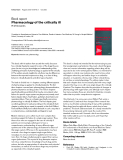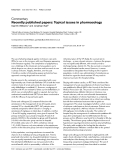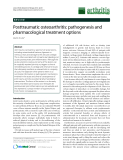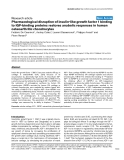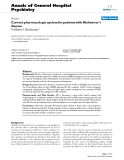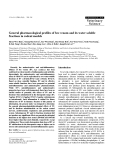
General pharmacology
-
Tuyển tập các báo cáo nghiên cứu về y học được đăng trên tạp chí y học General Psychiatry cung cấp cho các bạn kiến thức về ngành y đề tài: Pharmacology of the critically ill...
 1p
1p  thulanh16
thulanh16
 22-10-2011
22-10-2011
 38
38
 3
3
 Download
Download
-
Tuyển tập các báo cáo nghiên cứu về y học được đăng trên tạp chí y học General Psychiatry cung cấp cho các bạn kiến thức về ngành y đề tài: Recently published papers: Topical issues in pharmacology...
 2p
2p  thulanh16
thulanh16
 22-10-2011
22-10-2011
 45
45
 4
4
 Download
Download
-
Tuyển tập các báo cáo nghiên cứu về y học được đăng trên tạp chí y học General Psychiatry cung cấp cho các bạn kiến thức về ngành y đề tài: Posttraumatic osteoarthritis: pathogenesis and pharmacological treatment options...
 9p
9p  thulanh16
thulanh16
 21-10-2011
21-10-2011
 45
45
 4
4
 Download
Download
-
Tuyển tập các báo cáo nghiên cứu về y học được đăng trên tạp chí y học General Psychiatry cung cấp cho các bạn kiến thức về ngành y đề tài: Pharmacological disruption of insulin-like growth factor 1 binding to IGF-binding proteins restores anabolic responses in human osteoarthritic chondrocytes...
 11p
11p  thulanh11
thulanh11
 11-10-2011
11-10-2011
 73
73
 3
3
 Download
Download
-
Tuyển tập các báo cáo nghiên cứu về y học được đăng trên tạp chí y học General Psychiatry cung cấp cho các bạn kiến thức về ngành y đề tài: Current pharmacologic options for patients with Alzheimer's disease...
 14p
14p  thulanh10
thulanh10
 09-10-2011
09-10-2011
 46
46
 5
5
 Download
Download
-
Tuyển tập các báo cáo nghiên cứu khoa học quốc tế về bệnh thú y đề tài: General pharmacological profiles of bee venom and its water soluble fractions in rodent models
 10p
10p  hoami_266
hoami_266
 16-09-2011
16-09-2011
 45
45
 1
1
 Download
Download
-
This chapter provides a brief overview of the immune response as background for understanding the mechanism of action of immunomodulatory agents. The general principles of pharmacological immunosuppression are discussed in the context of potential targets, major indications, and unwanted side effects.
 26p
26p  vanass
vanass
 01-04-2011
01-04-2011
 69
69
 9
9
 Download
Download
-
Harrison's Internal Medicine Chapter 15. Headache Headache: Introduction Headache is among the most common reasons that patients seek medical attention. Diagnosis and management is based on a careful clinical approach that is augmented by an understanding of the anatomy, physiology, and pharmacology of the nervous system pathways that mediate the various headache syndromes. General Principles A classification system developed by the International Headache Society characterizes headache as primary or secondary (Table 15-1).
 5p
5p  ongxaemnumber1
ongxaemnumber1
 26-11-2010
26-11-2010
 89
89
 5
5
 Download
Download
-
Renal Disease Renal excretion of parent drug and metabolites is generally accomplished by glomerular filtration and by specific drug transporters, only now being identified. If a drug or its metabolites are primarily excreted through the kidneys and increased drug levels are associated with adverse effects, drug dosages must be reduced in patients with renal dysfunction to avoid toxicity. The antiarrhythmics dofetilide and sotalol undergo predominant renal excretion and carry a risk of QT prolongation and arrhythmias if doses are not reduced in renal disease.
 5p
5p  tubreakdance
tubreakdance
 26-11-2010
26-11-2010
 114
114
 5
5
 Download
Download
-
Deliberate and accidental self-poisoning Principles of treatment Poison-specific measures General measures Specific poisonings: cyanide, methanol, ethylene glycol, hydrocarbons, volatile solvents, heavy metals, herbicides and pesticides, biological substances (overdose of medicinal drugs is dealt with under individual agents) Incapacitating agents: drugs used for torture drugs, and psychotropic drugs is increasing. Repeated episodes are not rare.1 Prescribed drugs are used in over 75% of episodes but teenagers tend to favour nonprescribed analgesics available by direct sale, e.g.
 13p
13p  bigbaby87
bigbaby87
 03-09-2010
03-09-2010
 96
96
 12
12
 Download
Download
-
If a drug is administered by constant-rate i.v. infusion it is important to know when steady state has been reached, for maintaining the same dosing schedule will then ensure a constant amount of drug in the body and the patient will experience neither acute toxicity nor decline of effect. The t1/2 provides the answer: with the passage of each t1/2 period of time, the plasma concentration rises by half the difference between the current concentration and the ultimate steady-state (100%) concentration. ...
 13p
13p  bigbaby87
bigbaby87
 03-09-2010
03-09-2010
 99
99
 15
15
 Download
Download
-
How drugs act and interact, how they enter the body, what happens to them inside the body, how they are eliminated from it; the effects of genetics, age, and disease on drug action — these topics are important for, although they will generally not be in the front of the conscious mind of the prescriber, an understanding of them will enhance rational decision taking. Knowledge of the requirements for success and the explanations for failure and for adverse events will enable the doctor to maximise the benefits and minimise the risks of drug therapy. Pharmacodynamics.
 15p
15p  bigbaby87
bigbaby87
 03-09-2010
03-09-2010
 3462
3462
 24
24
 Download
Download
CHỦ ĐỀ BẠN MUỐN TÌM








